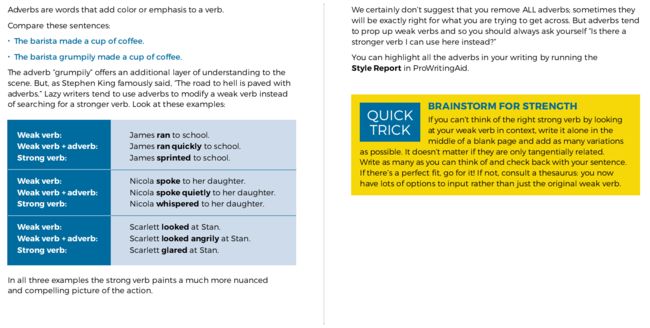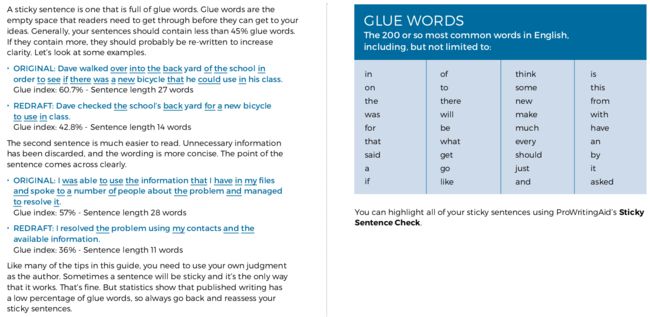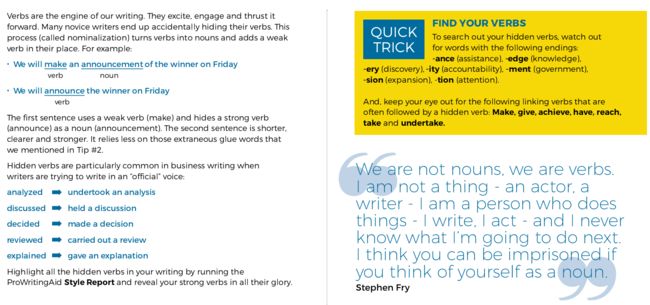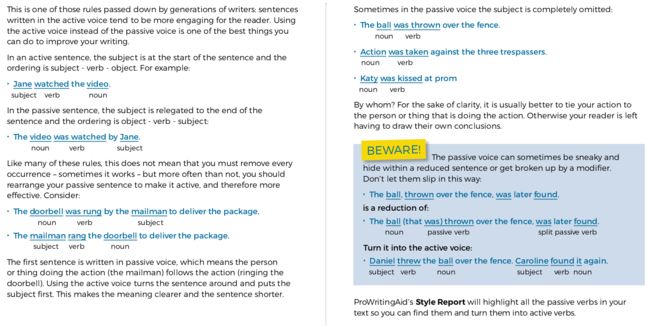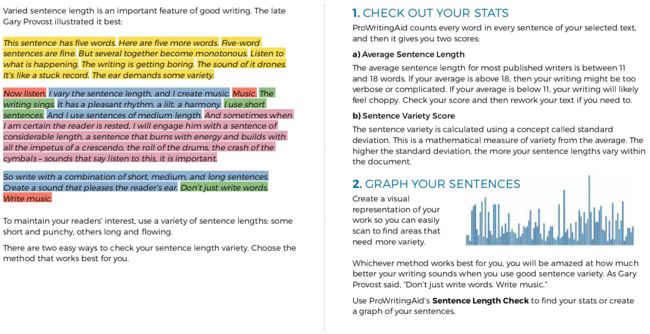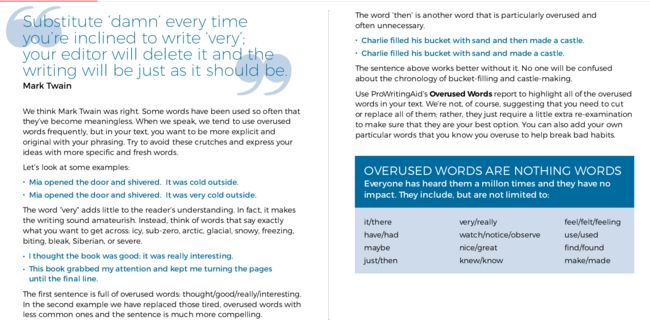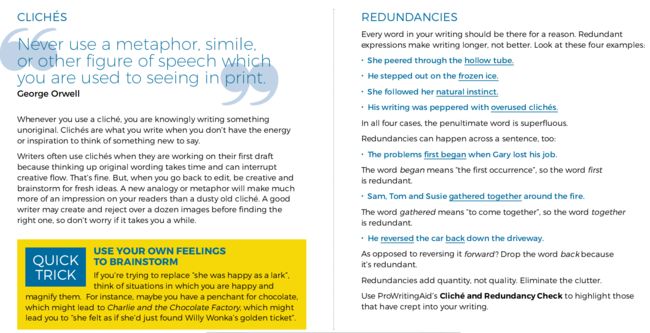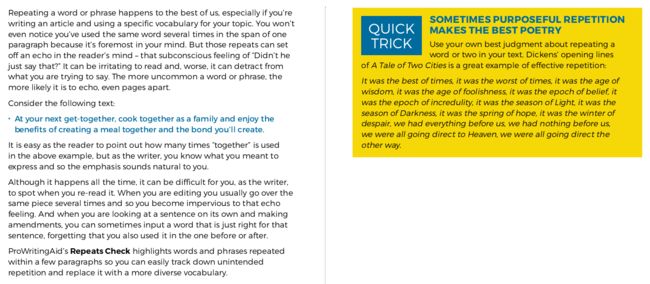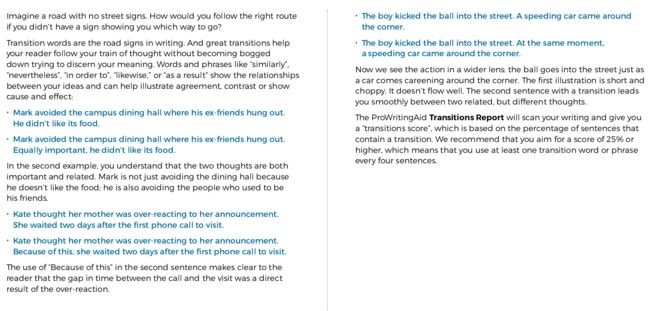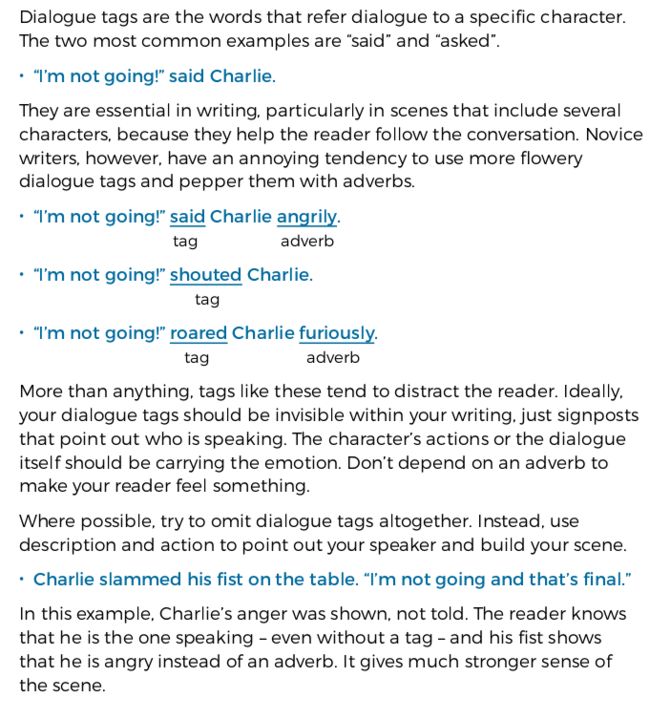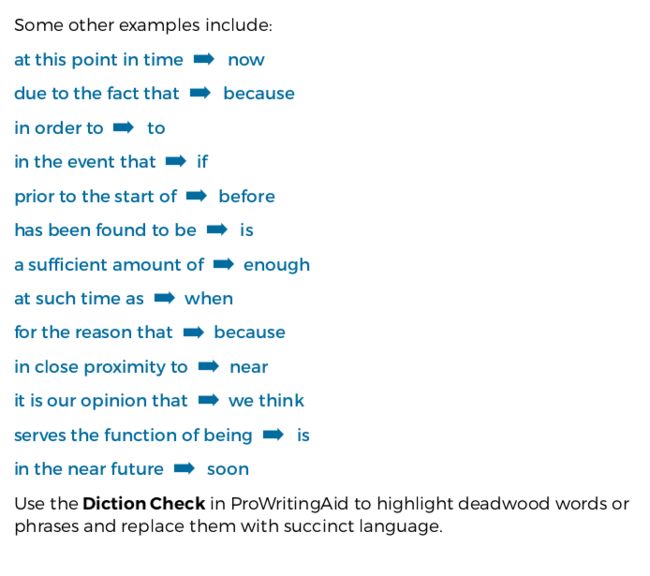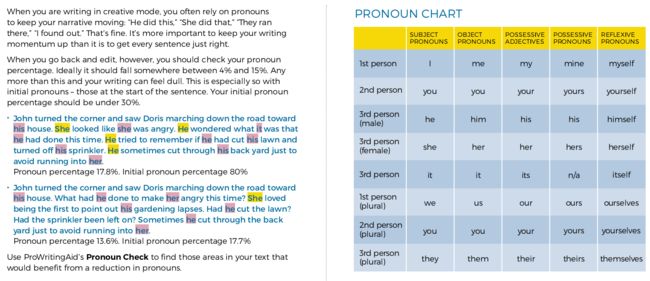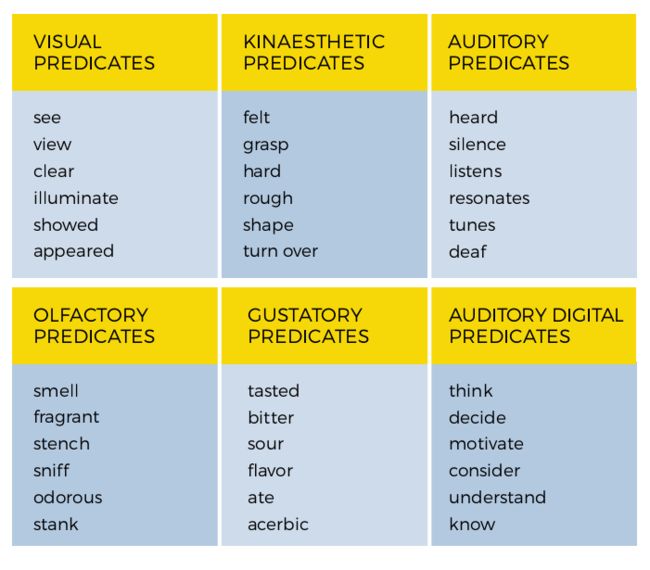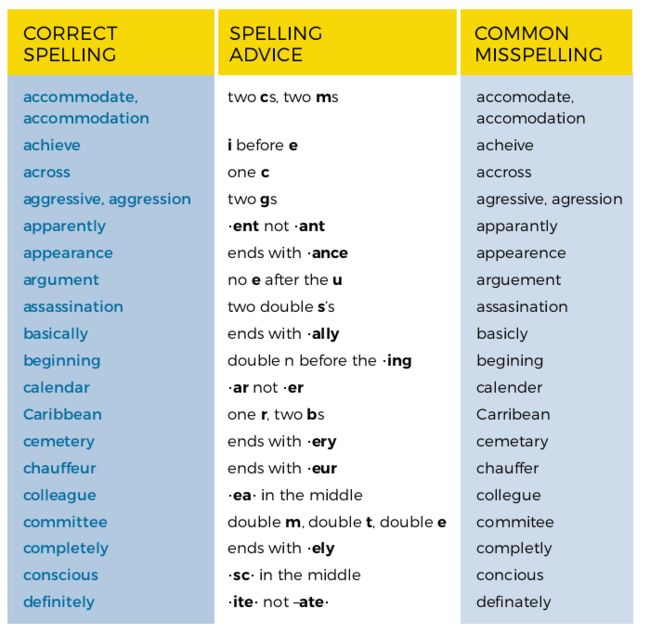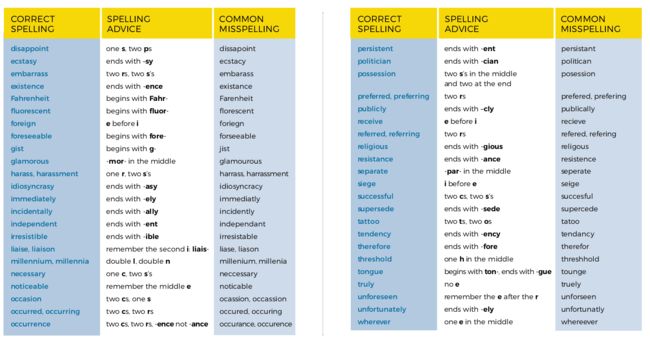TIP#1 Use adverbs very carefully
TIP#2 Avoid sticky sentences
TIP#3 Don't hide your verbs,rejoice in them!
TIP#4 Favor active verbs
TIP#5 Vary your sentence length
TIP#6 Don't overuse words
TIP#7 Cliches are boring and redundancies are annoying
TIP#8 Don't repeat yourself
TIP#9 Use more transitions
TIP#10 De-tag your dialogue!the Editor shouted angrily
If the dialogue is so weak that the writer has to re-explain what emotions or motivations are being conveyed, there may be more serious problems lurking.
Joe Moore, author of The Cotten Stone Mystery Series
TIP#11Chop away deadwood
I believe more in the scissors than I do in the pencil. ---Truman Capote
If you take one key message from ProWritingAid, it’s that when it comes to writing, less is more. Make every word count. If it doesn’t move your plot forward or express an essential idea, cut it! Writers often use deadwood phrases: the wordy ways of saying simple things. Why write “has the ability to” when you can write “can”? You’re just using more words to say the same thing, which actually makes your writing much less readable. Look through your writing for a simpler way of saying the same thing.
TIP#12 Beware of Purple Prose
The term Purple Prose was coined by the poet Horace. He found this pretentious kind of writing unbearable and compared it to poor people who sewed patches of purple onto their clothing because purple was associated with wealth. The patch was not a signifier of true wealth, just as Purple Prose is not a signifier of true great writing.
Searching for Purple Prose is slightly more complicated as it can manifest in many different ways. Try running ProWritingAid’s Complex Words Check to find unnecessarily complicated words, and the Diction Check to find overly complicated phrases. The Style Check can also be useful in tracking down passages that are overly purple.
TIP#13 Watch your pronouns
TIP#14 Use all five of your sense
Every writer has a tendency to favor one or two of their senses over the others, and this affects the way that he or she experiences the world, processes information and makes memories. This means that we tend to describe characters, settings or actions using words related to our own favored senses. Writing that skews too far toward one sense over the others will resonate more with readers who favor the same sense and less so with those who do not.
The term “NLP predicate” refers to those words (primarily verbs, adverbs and adjectives) associated with the specific senses. There are thousands of words associated with each but some examples are included, right:
TIP#15 Always delete words that you misspell and type them again
This is a great tip for improving your spelling. In today’s world of spellcheckers it’s easy to go on misspelling words forever as you just correct them with your mouse. We recommend spending a bit of time upfront improving your spelling to save time in the future. Every time you misspell a word, delete the whole word and re-type it again, paying attention to the spelling.
When you run the Grammar Check in the free version of ProWritingAid, your spelling mistakes are presented to you in a read-only format. This is good because it forces you to go back and correct the error in your document. The premium version allows you to edit as you go along. You can correct errors by choosing from a drop down menu (online) or double�clicking (add-in). This saves time in the short term and is great when you have a lot of text to get through, but we still recommend that if you see a word that you know you have trouble with, take the time to retype it. It will help stop you from making the same error again in the future.
TIP#16 Check your pace
Any areas shown in white are areas of slower pacing. Try and add some more action to areas that contains lots of white. Different stories will allow for different paces.Readers will expect more slowly paced passages in a dense historical drama than in a modern thriller.
TIP#17 Strengthen your metaphors
Finding the right metaphor is like dating: you may have to reject many before you find the right one, and when you find it, you’ll know it’s the perfect match.
The Road Not Taken by Robert Frost
Two roads diverged in a yellow wood,
And sorry I could not travel both
And be one traveler, long I stood
And looked down one as far as I could
To where it bent in the undergrowth;
Then took the other, as just as fair,
And having perhaps the better claim
Because it was grassy and wanted wear,
Though as for that the passing there
Had worn them really about the same,
And both that morning equally lay
In leaves no step had trodden black.
Oh, I kept the first for another day!
Yet knowing how way leads on to way
I doubted if I should ever come back.
I shall be telling this with a sigh
Somewhere ages and ages hence:
Two roads diverged in a wood, and I,
I took the one less traveled by,
And that has made all the difference
TIP#18 Read your work aloud
The human brain is always trying to be helpful by filling in missing information. Most of the time, that’s great. It’s how animation works. Animators just need to show you a succession of images, and your brain links them all together and provides the missing information that turns them into a movie.
The same thing happens when you are reading, especially if it’s your own writing. I’m sure you have all carefully proofed a sentence and still missed an obvious typo. That’s because your brain guesses what’s supposed to be there and so replaces it in your head with the correct word or spelling. This was circulating on the internet a while back.
Isn’t your brain clever to make sense of all that nonsense? Yes, but, this very same skill is what makes self-editing so much more difficult. Your brain sees what you meant to say, rather than what you wrote. When you are reading aloud, however, it’s much harder to skip over errors. You are more likely to hear what is actually on the page rather than what you meant to write.
Quick Tricks
Change Your Font
Before you read your writing aloud it is a good idea to change the text to an unfamiliar font. Your brain needs to work that extra bit harder to read eachword, so you are more likely to catch those errors.
USE TEXT TO SPEECH SOFTWARE
You could also try listening to your text by inputting it into a TexSpeech app like Ivona. Hearing your words read aloud, even if it’a computer-generated voice, is a great way to catch errors.
TIP#19 Always get someone else to read your work
At its foundation the role of the editor is a blend of meddler and midwife. ---Nell Frizzell, journalist
Even the most popular authors in the world have people in their lives that read their work and give them feedback. It may be their husband, best friend or a professional editor (or all of those people at different points in their writing process) but they find the person they trust to give them that essential feedback to improve their writing. Use an editing tool and some of the techniques listed here to get your writing as close to perfect as you can manage. Ideally 80% of your technical editing should be done by you so that your beta reader or editor can focus on the meat of your writing. They can help you develop your trenths as a writer and oint out areas that need further develoment.
There are huge numbers of online writing communities that help writers find readers for their work. “Beta readers” are non-professionals who love reading and giving feedback and there are millions of them around the world. Try websites like Scribophile or Creative Critique to find an online beta reader, or use Google to find local writers’ groups.
Quick Trick:
Ask Good Questions
To avoid generic feedback like “I liked it” or “it was good”, ask your reader specific questions. For articles and blog posts, ask a friend or colleague:
1 Did it read smoothly from top to bottom, or were there areas that felt rough or out of place?
2 Were there any sentences that you had to read twice to get the meaning?
3 Were there words that you were unfamiliar with?
4 Was the argument cohesive?
5 Are there elements that should be fleshed out further?
6 Is the tone right for the target audience?
For fiction writing, here are some questions that you might find helpful:
1 Did the beginning of the story capture your interest right away?
2 Did you find the main character relatable? Did you care what happened to him or her?
3 What was your favorite scene?
4 What sections did you find boring?
5 Were there points in the story that didn’t make sense or that you found frustrating?
6 Did you feel compelled to keep reading? Why or why not?
7 Did you ever get confused about who was who?
8 Were there any sections that you felt got bogged down with too much backstory, dialogue, or description? Or that needed more?
TIP#20 Stop tinkering and get it out there
We have stressed throughout this document that editing is essential. ---Leonardo da Vinci
Writers should expect to spend almost as much time editing as they do writing. Every paragraph should be reassessed, revised or even rewritten at least a couple of times. No one writes so well on their first draft that they
can’t think of ways to express some of their ideas in a better way. It is an essential process if your writing is going appear polished and professional to readers and potential publishers.
Writing is not like doing a mathematics equation. It’s never perfect. It’s never solved. There is never a moment when you think “Yep, every word in this manuscript now adds up completely to form the perfect story.” The tricky part is knowing when to stop.
We have stressed throughout this document that editing is essential. Writers should expect to spend almost as much time editing as they do writing. Every paragraph should be reassessed, revised or even rewritten at least a couple of times. No one writes so well on their first draft that they can’t think of ways to express some of their ideas in a better way. It is an essential process if your writing is going appear polished and professional to readers and potential publishers.
At the end of that edit, you are probably ready to let it go. Stop focusing on making the book, and start focusing on getting it out into the world.
